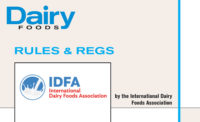In a statement released on July 26, FDA Commissioner Scott Gottlieb, M.D., addressed the process FDA is undertaking for reviewing and modernizing the agency’s standards of identify for dairy products.
“Improvements in diet and nutrition offer one of the greatest opportunities to profoundly impact human health,” Gottlieb said. “Innovation in the food sector is occurring rapidly to address this opportunity and meet the needs and values of modern consumers. The FDA is committed to advancing policies that enable consumers to safely benefit from innovations in how foods are produced.
“I outlined these goals, and some of the ways we seek to achieve them, in our Nutrition Innovation Strategy,” he continued. “Keeping pace with the rapid innovation that has the potential to improve the choice consumers have, and the nutritional attributes of the foods they consume, is core to this commitment. So is empowering consumers with the information they need to make good choices about the foods they eat through greater transparency about food attributes.
“Food labels — including the name of food — inform consumers about what they’re buying, and standards of identity are used to ensure that foods have the characteristics expected by consumers,” Gottlieb added. “The information provided through food labeling must be truthful and not misleading. The consumer choices made based on this information can have important impacts on health.
“At the same time, the FDA is also taking actions to facilitate food innovations that can give consumers more choices, enable better nutrition and improve labeling to reflect the healthy attributes of food,” he said. “Diet is a powerful tool for reducing chronic disease and its impact on the healthcare system. Among other new steps we’re taking, modernizing the outdated framework for food standards will allow industry flexibility for innovation to produce more healthful foods while maintaining the basic nature, essential characteristics and nutritional integrity of key food products.
“One area that needs greater clarity — and which has been the subject of much discussion of late — is the wide variety of plant-based foods that are being positioned in the marketplace as substitutes for standardized dairy products,” Gottlieb noted. “Many of these plant-based foods use traditional dairy terms (e.g., milk, yogurt, cheese) in the name of the product. For instance, we’ve seen a proliferation of products made from soy, almond or rice calling themselves milk. However, these alternative products are not the food that has been standardized under the name “milk” and which has been known to the American public as “milk” long before the 1938 Federal Food, Drug, and Cosmetic Act (FD&C Act) was established. In addition, some of these products can vary widely in their nutritional content – for instance in relation to inherent protein or in added vitamin content – when compared to traditional milk.”
Read more here.


